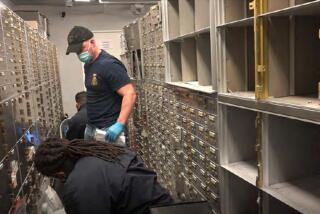Bag Search in Airport X-Ray Lines Upheld
- Share via
SAN FRANCISCO — When airline passengers place their hand luggage on an X-ray conveyor belt for inspection, they give their implied consent to a search of the bags and cannot take them back, a federal appeals court ruled.
Pre-boarding searches for explosives and weapons are legal as long as there is implied passenger consent, the 9th U.S. Circuit Court of Appeals said Tuesday.
Placing bags on the X-ray conveyor belt constitutes that consent and passengers cannot take their bags back to prevent further searches, Judge J. Blaine Anderson wrote for the three-judge panel.
But the court noted that the searches must be related to security and cannot be done for the sole purpose of seeking drugs.
In balancing the individual’s right against intrusive searches with society’s interest in safe air travel, the court said, “The governmental interest in detecting the weapons employed in airline terrorism is great.”
The appeals court said so long as the searches are limited to the detection of weapons, explosives or other dangerous devices and the search itself produces little social stigma, it is an intrusion a “free society is willing to tolerate.”
The ruling overturned a lower court decision in Los Angeles that held that cocaine was illegally seized from the bag of Jorge A. Pulido-Baquerizo. U.S. District Judge Robert Takasugi had suppressed the government’s use of the cocaine evidence, declaring it the result of an illegal search.
Security guards at Los Angeles International Airport said they spotted an object that they could not identify in Pulido-Baquerizo’s bag on Sept. 30, 1985. They believed it might be a bomb. A hand search turned up 2,138 grams of cocaine. The ruling opened the way to a new trial.
More to Read
Sign up for Essential California
The most important California stories and recommendations in your inbox every morning.
You may occasionally receive promotional content from the Los Angeles Times.













